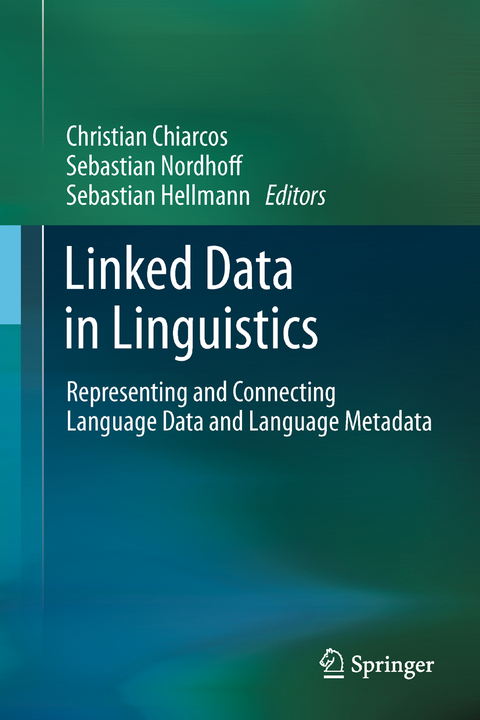
Linked Data in Linguistics
Springer Berlin (Verlag)
978-3-642-43496-9 (ISBN)
The explosion of information technology has led to substantial growth of web-accessible linguistic data in terms of quantity, diversity and complexity. These resources become even more useful when interlinked with each other to generate network effects.
The general trend of providing data online is thus accompanied by newly developing methodologies to interconnect linguistic data and metadata. This includes linguistic data collections, general-purpose knowledge bases (e.g., the DBpedia, a machine-readable edition of the Wikipedia), and repositories with specific information about languages, linguistic categories and phenomena. The Linked Data paradigm provides a framework for interoperability and access management, and thereby allows to integrate information from such a diverse set of resources.
The contributions assembled in this volume illustrate the band-width of applications of the Linked Data paradigm for representative types of language resources. They cover lexical-semantic resources, annotated corpora, typological databases as well as terminology and metadata repositories. The book includes representative applications from diverse fields, ranging from academic linguistics (e.g., typology and corpus linguistics) over applied linguistics (e.g., lexicography and translation studies) to technical applications (in computational linguistics, Natural Language Processing and information technology).
This volume accompanies the Workshop on Linked Data in Linguistics 2012 (LDL-2012) in Frankfurt/M., Germany, organized by the Open Linguistics Working Group (OWLG) of the Open Knowledge Foundation (OKFN). It assembles contributions of the workshop participants and, beyond this, it summarizes initial steps in the formation of a Linked Open Data cloud of linguistic resources, the Linguistic Linked Open Data cloud (LLOD).
Sebastian Hellmann, B.Eng., wurde 1984 in Wippra geboren. Nachdem er eine Berufsausbildung als Gas- und Wasserinstallateur in einem Fachunternehmen der Branche erfolgreich absolvierte, entschied sich der Autor seine Kenntnisse durch ein Studium zu erweitern. Das Bachelorstudium der Gebäude- und Energietechnik an der Fachhochschule Erfurt schloss er im Jahre 2012 erfolgreich ab. In der Studienzeit konnten durch Praktika weitere Kenntnisse aus dem interessanten Einsatzfeld der Gebäude- und Energietechnik erlangt werden. So entwickelte der Autor bereits während des Studiums ein besonderes Interesse im Bereich der Klimatisierung mit der Gasmotorwärmepumpe.
Introduction and Overview. C. Chiarcos, S. Hellmann, and S. Nordhoff.- Part I Lexical Resources.- Treating Dictionaries as a Linked-Data Corpus. P. Bouda and M. Cysouw.- Integrating WordNet and Wiktionary with lemon. J. McCrae, E. Montiel-Ponsoda, and P. Cimiano.- Integrating Lexical Resources Through an Aligned Lemma List.- A. Herold, Lothar Lemnitzer, and A. Geyken.- Linking Localisation and Language Resources. D. Lewis, A.O'Connor, S. Molines, L. Finn, D. Jones, S. Curran, and S. Lawless.- Part II Corpus Building and Annotation.- Reusing Linguistic Resources: Tasks and Goals for a Linked Data Approach. M. van Erp.- A Discourse Information Radio News Database for Linguistic Analysis. K. Eckart, A. Riester, and K. Schweitzer.- Integrating Treebank Annotation and User Activity in Translation Research. M. Carl and H. Høeg Müller.- Creating Linked Data for the Interdisciplinary International Collaborative study of Language Acquisition and Use: Achievements and Challengesof a New Virtual Linguistics Lab. M. Blume, S. Flynn, and B. Lust.- Part III Terminology Repositories and Knowledge Bases.- Linking to Linguistic Data Categories in ISOcat. M. Windhouwer and S.E. Wright.- Towards Linked Language Data for Digital Humanities. T. Declerck, P. Lendvai, K. Mörth, and G. Budin and T. Váradi.- OntoLingAnnot's Ontologies: Facilitating Interoperable Linguistic Annotations (up to the Pragmatic Level). A. Pareja-Lora.- Using Linked Data to Create a Typological Knowledge Base. S. Moran.- TYTO - A Collaborative Research Tool for Linked Linguistic Data. A. C. Schalley.- Part IV Towards a Linguistic Linked Open Data Cloud.- Recent Activities of the Open Linguistics Working Group The Open Linguistics Working Group of the Open Knowledge Foundation. C. Chiarcos, S. Hellmann, and S. Nordhoff.- Interoperability of Corpora and Annotations. C. Chiarcos.- The German DBpedia: A Sense Repository for Linking Entities. S. Hellmann, C. Stadler, and J. Lehmann.- Linked Data for Linguistic Diversity Research: lottolog/Langdoc and ASJP Online.- S. Nordhoff.- Linking Linguistic Resources: Examples from the Open Linguistics Working Group. C. Chiarcos, S. Hellmann, and S. Nordhoff.
| Erscheint lt. Verlag | 13.4.2014 |
|---|---|
| Zusatzinfo | XIV, 218 p. |
| Verlagsort | Berlin |
| Sprache | englisch |
| Maße | 155 x 235 mm |
| Gewicht | 361 g |
| Themenwelt | Informatik ► Theorie / Studium ► Künstliche Intelligenz / Robotik |
| Schlagworte | data structures • interoperable representation formalisms • knowledge integration (linking) from various sourc • knowledge integration (linking) from various sources • linguistic databases, linguistic corpora, lexical • linguistic databases, linguistic corpora, lexical resources • Linguistic Linked Open Data • modeling linguistic resources |
| ISBN-10 | 3-642-43496-7 / 3642434967 |
| ISBN-13 | 978-3-642-43496-9 / 9783642434969 |
| Zustand | Neuware |
| Haben Sie eine Frage zum Produkt? |
aus dem Bereich


